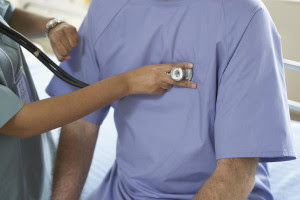
COPD, Why Me?
Have you or a loved one been recently diagnosed with chronic obstructive pulmonary disease? If so the chances are you have a lot of questions regarding what got me here, what are the treatment options, and is my life ever gonna be the same?
Any questions or concerns should be discussed with your doctor and it is encouraged to have a very open and honest relationship with them.
After all they are a medical professional and your best tool in living a healthy life with COPD.
There are many things you will have to change or adjust while living with COPD, things such as diet, and exercise as well as taking any additional medications as prescribed by your doctor which can include the use of oxygen therapy.
Today we will be discussing how life will be a little different with the prognosis of COPD and ways to adjust your life to be COPD friendly.
What got me here?
This is a common questions among recently diagnosed COPD patients, and the reason being is because the lungs were exposed to excess amounts of dust, dirt, air pollution, and the biggest cause being smoking.
Over time and constant exposure to these irritants the lungs became weakened therefore making the heart work harder, and causing the airflow in and out of the lungs to be limited (breathlessness). Unfortunately the damage done to the lungs is irreversible, however that shouldn't discourage you from improving your lung function. With the help of dedicated researchers and the advancement of medical technology there are numerous amounts of treatment options that will ensure your quality of life to improve!
Now what?
Often times at the time of prognosis patients instantly think they will be confined to their home and will no longer be able to do activities they love, that may have been the case years ago but with advances in oxygen therapy that is no longer the case. Portable oxygen concentrators make living a social and active life with COPD possible, these small medical devices take outside air which is 79% nitrogen and 21% oxygen, and send it through the sieve bed which then converts the air into medical grade oxygen (90% - 95% purity).
One major difference between standard oxygen tanks and portable oxygen concentrators is that portable oxygen concentrators are FAA approved and can be used during flights, where as oxygen tanks are not and hold a potential fire hazard. To obtain a oxygen concentrator you must first have a prescription from your doctor stating you need medical grade oxygen. Other treatment options include corticosteriods or bronchodilators, before starting a treatment option be sure to speak with your doctor.
Lifestyle Changes
In addition to oxygen therapy or other treatment options you will have to totally change your eating patterns as well as including exercise into your everyday life (if not already done so). Once beginning a diet and exercise plan the first and most important thing to do is quit smoking if not already done so, this is what got you here so if you need help quitting smoking then speak with your doctor about potential options. Quitting will also help improve your overall lung function and at helping slow the progression of COPD.
The human body uses food as an energy and nutritional source, therefore what you put into your body will reflect how you feel (physically and emotionally), as well as the symptoms felt from COPD. The days of junk food are behind you and replaced with a diet filled with brown rice, fiber 20 - 35 grams a day, whole grain, fish with high oils such as salmon or sardines, and dark colored vegetables such as broccoli and fruit. Also keep in mind to stay hydrated and drink 6 to 8 ounces of non-caffeinated beverages, fluids will help break apart the built up mucus making expelling easier. Since breathing in patients with COPD can require up to 10 times more calories than a non COPD patient, it is extremely important to design a meal plan with your respiratory specialist and stick to it.
Exercise, Exercise, Exercise!
In congruence with adjustments to your diet plan you will also have to start exercising on a regular basis if not already done so. Being overweight and having COPD do not mix well because the excess weight puts more of a task on the lungs, making breathing more difficult as well as needing more oxygen to supplement the body. On the other hand being underweight can be damaging for the body because that will leave you feeling low of energy and tired.
Keep in mind that patients diagnosed with COPD can use up to 10 times more calories than that of a non COPD patient. Which is why it is extremely important to have a well balanced diet that will supply the body with adequate nutrition, in addition to a set exercise plan that will keep you physically fit and active so you can have the energy to do the activities you love!
Chronic obstructive pulmonary disease is no longer a death sentence and patients do have the power to take back control of their lives. With the help of doctors, following a designated meal and exercise plan, and keeping up with all medications you can get back to living the life you had before COPD.
+Caleb Umstead



